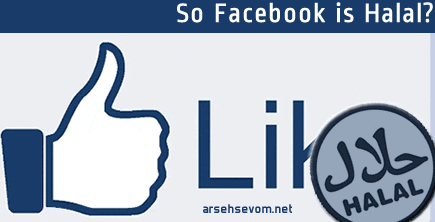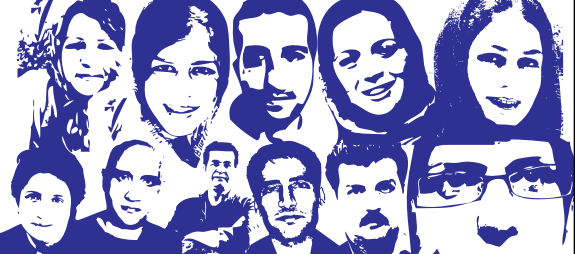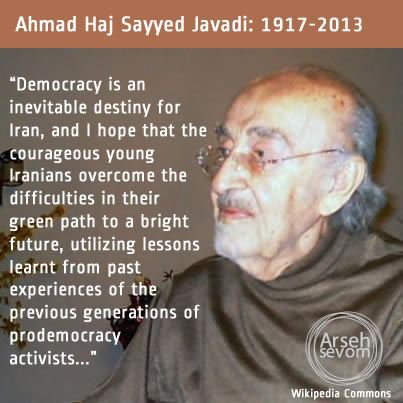
Happy Holidays
December 20, 2012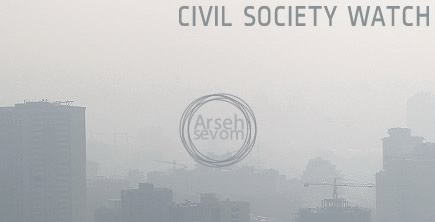
Iran: Taking Our Breath Away
January 10, 2013So Facebook is Halal all of a sudden?
Iran is known for its relentless internet filtering policy and brutal behavior against defiant netizens who challenge them. Facebook, Twitter, and YouTube are among the sites Iranian authorities deemed decadent, instances of the so-called “Western soft war” conspired by the likes of the “Zionists” As a matter of fact, Iran stands one of the top five “Internet Enemies” according to Reporters Without Borders list [en].
Amid all discussions on launching a halal or national Internet, Ayatollah Khamenei, the Supreme Leader of Iran took everybody by surprise with a new Facebook page launched on December 13, 2012. We are talking about the same Facebook access which for most Iranian citizens requires special software or a Virtual Private Network to bypass the country’s strict filtering! The news became official on December 15 when Mr. Khamenei’s Twitter account, believed to be run by his office, promoted the page by posting a link to it. According to the Guardian [en], Khamenei’s official website has not yet confirmed the existence of the page, but Baztab, a conservative news website, said the account was run by his office. In defense of Mr. Khamanei, Mehr News [fa] blames criticized Western news outlets for their reporting, stating:
“A simple search shows over a hundred accounts and similar pages attributed to Ayatollah Khamenei on Facebook.”
What Mehr fails to mention is that only one of these pages has been promoted through Khamenei’s Twitter account.
In addition to the recent Facebook account, Mr. Khamenei has a Twitter account and uses Instagram. On the flip side he has been very vocal about his opposition to social networks, reports smallmedia [en].
According to the Daily Mail [en], the U.S. State Department said it will keep tabs on the page, but had no comment on whether it was genuine or not. Spokeswoman Victoria Nuland joked that Washington is curious how many ‘likes’ the Khamenei page receives.
Ayatollah Khamenei’s Facebook debut has generated heated debates in the Iranian online community. The ayatollah seems to have attracted over 20,000 “likes” so far. Unsurprisingly, the censorship apparatus seems to be on guard here too as critical comments on this page are being removed and people have been quickly blocked by the page’s admin. Masih Alinejad, an exiled journalist, posted on her Facebook page [fa]:
“The virtual guardianship of Khamenei on Facebook: If Mr. Khamenei or his office has officially joined Facebook, this implies that he has made up his mind to fight the ‘enemy’ behind the enemy’s line.”
She continues her post by publishing her comments on the ayatollah’s page which were removed in a blink of an eye:
“If this is your official page, your majesty, you undoubtedly realized that there is no leader of a country nowadays who has never done an interview with a journalist throughout his leadership period. So please inbox me your telephone number so that I can bother you for an interview over phone.”
Some have encouraged people to report this page as spam and ask Facebook to block the page. The have also created a new page called “No to Ayatollah Khamenei” and urged him to leave Facebook. They claim that free access to information and the internet is everybody’s right, not one exclusive to the leader.
The blog “Evolution-adam” [fa] posted a tampered a screenshot of the page and portraying Bashar Assad, Putin, Ayatollah Mesbah, [former] Judge Mortazavi, Seyed Hassan Nasrollah, Shariatmadari, and Kim Jong-un in the friend list of Khamenei.
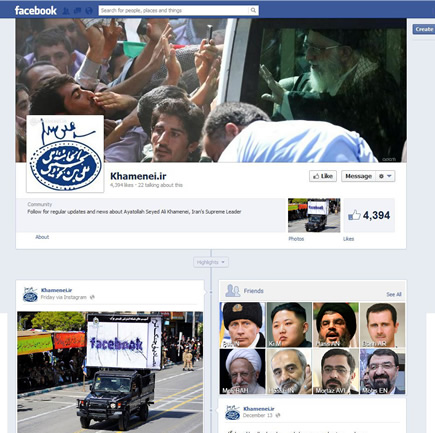
In a blog entry titled “it is a crime for ordinary people but it is permitted for him”, the author wrote [fa]:
“Ayatollah Khamenei has recently launched his Facebook page while Facebook is blocked in Iran and the use of anti-filters is a crime!…What kind of a law is it when breaking it is easy for the authorities but ordinary people are jailed, lashed, or end up like Sattar Beheshti if they don’t respect it.”
Former vice president Mohammad Ali Abtahi takes a different view. In his blog [fa] he writes:
“I believe this debut requires the attention of Internet policy makers and telecom organization officials. The most important thing here is to lift the filters on the page so that everybody can have access to it. Connecting to the highest-ranking official of the country for those inside by using circumventors is considered disrespectful to the people and to the Supreme Leader himself.”
On the page itself, many have commented only to be swiftly removed by the page admin. “When Bashar Assad falls, you will be next,” read a post which quickly disappeared. Another post with a similar fate read: “Which VPN do you use?”
Plenty of posts could also be seen urging the ayatollah to release political prisoners, grant freedom of expression and assembly, and allow free and fair elections. On the other hand, there are many comments praising Ayatollah Khamenei, which are not removed.
Despite the fact that the page has been widely publicized and commented on, so far there has been neither confirmation nor denial from Ayatollah Khamenei’s office. Confirmation from his office would highlight the double standards of the regime against social media. Meanwhile, Facebook is all about interaction and engagement, not just removing comments and blocking users. It is not clear how long will the supreme leader be able to maintain a similar no comment approach. Only time will tell.


